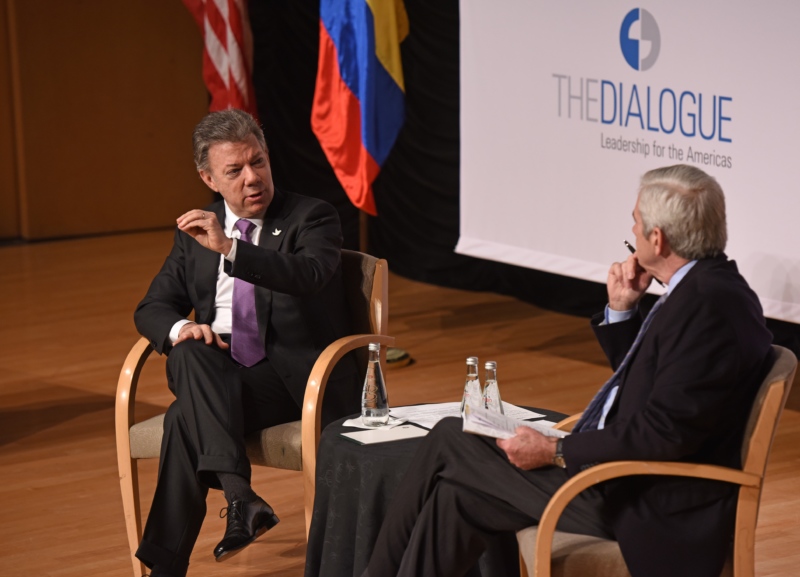Colombia: Transformation and Future Challenges
 USIP staff photographer
USIP staff photographer
On February 3rd, the Inter-American Dialogue, the Adrienne Arsht Latin America Center at the Atlantic Council, the Latin American Program at the Wilson Center, the United States Institute of Peace, and the Council of the Americas sponsored a keynote address and discussion with His Excellency Juan Manuel Santos Calderón, President of the Republic of Colombia, at the Ronald Reagan Building and International Trade Center. Tom Gjelten, a National Public Radio (NPR) correspondent, moderated the event.
President Santos discussed the overall progress on security and governance in Colombia during the last 15 years. He also discussed the continuing negotiations with FARC and the peace agreement. Among the issues discussed regarding the peace negotiations was the likeliness of complying with the March 23rd deadline. President Santos expressed his reassurance in said deadline and in the structure of the peace accord by insisting that the process would not culminate in impunity. Furthermore, President Santos described his full confidence that peace will be achieved and a deal reached through the negotiations with FARC.
"It’s going to take a long time to get Colombians used to a new order of peace, rather than war."
More specifically, he called on President Barack Obama to continue to lend US support as Colombia approaches the conclusion of its peace negotiation process, adding that he wants to build on successes from Plan Colombia and previous US aid to combat drug trafficking. Santos called this point in time “an irreversible moment” as the Colombian government and the FARC rebel group are on the verge of signing a peace agreement. He acknowledged the political costs of negotiating with the guerrilla group, rather than simply punishing all members of the FARC. “Making war, especially if you are winning, makes you popular. Making peace is much more difficult. Simply by sitting down with your enemy, that will bring you a political cost. When you start talking about concessions to the enemy, then you will incur a much higher cost.” However, Santos said the possibility of bringing peace to Colombia after five decades of war has been well worth any cost. “When you reach [peace], the cost becomes an investment,” Santos said.
The Colombian president also emphasized the importance of the role played by the United States in helping to provide stability to the South American nation. “Fifteen years ago, when Plan Colombia was launched, Colombia was on the verge of being declared a failed state,” Santos said. “And that’s when the United States [came to our assistance.]” He added that the United States was “extremely helpful in the process of bringing the conditions for peace. President Obama has been supportive of the peace process from the very beginning.” Santos praised Plan Colombia for not only helping to provide security and intelligence training to a war-torn nation, but also for its role in helping to strengthen public institutions, the justice system and for helping to aid in rural development. Santos added that if Colombia were able to reach an agreement, then the next important step is to implement the peace deal. While a signed agreement may signal the legal end to the conflict, Santos said, the real construction of peace will only have just begun. “It’s going to take a long time” to get Colombians used to a new order of peace, rather than war, Santos said. “The US was a great partner in bringing the end of the conflict, [and] they could be a great partner in the construction of peace.” Santos also called on Obama to collaborate with Colombia to combat the spread of Zika and other mosquito-borne diseases, as well as to fight organized crime.
“The US was a great partner in bringing the end of the conflict, [and] they could be a great partner in the construction of peace.”
The President then took five questions by representatives of each one of the co-sponsors. The questions were on his main concerns regarding the peace agreement, the US-Colombia Free Trade Agreement (FTA), the Trans-Pacific Partnership (TPP), and on the general US-Colombia partnership. The President wrapped up the event by sharing an anecdote of meeting President Hugo Chávez in an effort to demonstrate how the peace process has incorporated regional efforts and how Colombia has been working on rebuilding relations with its neighboring countries.



















